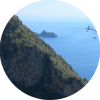The philosophical school of Elea - Velia: Parmenide, Zeno and Melissus of Samos

One of the prides of Velia (Elea) is the Eleatic school, a Pre-Socratic philosophical school that influenced subsequent philosophical currents such as atomism and the Socratic school, and in some ways, still lives on in contemporary philosophical trends. Eleatic philosophers opposed an anthropomorphic world made up of gods that were heavily humanized and sought to pursue the search for a unique, eternal, and unchangeable Being. Xenophanes, a philosopher who resided in Elea (Velia) in his old age and was likely the teacher of Parmenides, said, "They have attributed to the gods everything that is a source of blame for men: stealing, committing adultery, and deceiving each other."
In particular, the Eleatic school argued that the senses were deceptive and incapable of investigating the Being. Knowledge could only be developed from certain premises, and therefore only thought, using mathematical methods, could reach the Truth.
To understand the cultural revolution carried out by the philosophers of Elea (Velia), it is enough to consider that they opposed the Milesian school, whose doctrine was fundamentally based on naturalistic aspects, reducing every existence to a combination of basic elements. They also opposed Heraclitus' theory, which explained existence as continuous change. In simple terms, the Eleatics rejected the classical polytheistic world and affirmed a "monotheistic" worldview. For them, there was no creation because the Being (which in modern terms we could also call God, but being careful to note that it does not correspond to the Christian God; for the Eleatic philosophers, everything is God, or the sum of all things forms this divine being) could not have been created from non-Being, meaning that what exists could not have been created by what does not exist, and therefore the Being has always existed. The main representatives of the Eleatic school were the philosophers Parmenides and his pupils Zeno and Melissus of Samos.





